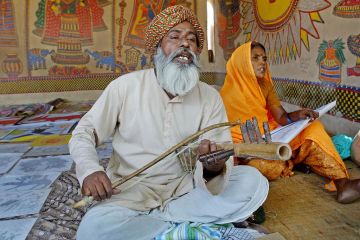 "That was the most difficult part, and continues to be, because it's very difficult to find the authentic, better artists of any practicing genre," Bhushan said.
"That was the most difficult part, and continues to be, because it's very difficult to find the authentic, better artists of any practicing genre," Bhushan said. "We found in our experience that the All India Radio stations in the local areas and some of the more knowledgeable program executives were the best sources of information, because over the years they have dealt with a lot of the artists."
Many of these musicians had never earned a living from singing and playing, and their remote houses weren't always easy to find, Bhushan recalls.
On one field trip, the team went to several villages with the same name asking for a washer man, or dhobi, called Babu Nandan Dhobi who'd they heard was a human lexicon of washer folk songs. When they finally found the 70-something-year-old musician, he was fast asleep in the tiny hut on his farm plot.
"We had to shake him awake almost, and he was completely shocked," Bhushan said. "He didn't know who we were or why we were there — three or four people from a city standing on top of him at his cot."
But soon after, when the musician had sent a boy to buy sweets for his guests and learned why they'd come, he began to explain how the rhythm of wet clothes striking against the river rocks makes the natural beat of the washerfolk's songs.
"He just started demonstrating for us with an imaginary cloth," Bhushan said. "And he continued to sing many, many songs for us."
Bhushan's unwitting tribute to John Lomax didn't go unrewarded — and neither have the musicians.
After a short stint giving away music downloads for free and hoping for charitable donations, Bhushan, Sharma and another partner, Prabhat Agarwal, started the Beat of India record label to print CDs and, subsequently, sell music downloads. Individual tracks — now archived by region, style, genre and other categories — sell for just $0.69.
All the artists receive an upfront payment that's significant relative to their income, and Beat of India pays a royalty fee of 10 percent from the sales of individual tracks and custom CDs. Moreover, the publicity has helped a number of the artists get gigs playing at large venues in urban India and even abroad, and several have been asked to record songs for films.
More recently, the musicology company has licensed 10 compilation albums to a local music distribution firm, Frankfinn, with better reach in physical stores. And Beat of India has also licensed a number of songs to an international aggregator that sells content onward to heavyweights like iTunes.
Sales are modest so far, but that was never the goal.
"Our focus was to try to popularize the folk music of India," Bhushan said. "You can't find the original sound, and there are a lot of people who are interested. We know from our own experience that it's really phenomenal, dynamic music. So [giving it a larger profile] has been the objective from the beginning."